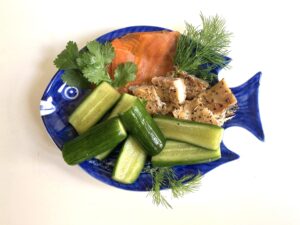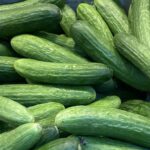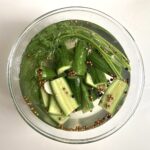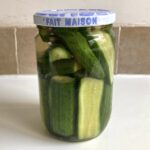
Home-style dill pickles
This is a recipe for the type of pickled cucumbers known as malasolnye (with little salt) in Ukrainian. They are crunchy and refreshing and will keep for up to a week in the fridge. The recipe is ultra simple. The main issue is finding the right kind of cucumbers.
 The best kind to use are the small, bumpy cukes also known as Kirby cucumbers — but unless you live near a farmers’ market you may be unable to find them. I substituted Lebanese cucumbers (shown at right). They’re thinner and shorter than standard cucumbers, about 6 inches (15 cm) long. If those are also unavailable, you can try using standard cukes cut into pieces.
The best kind to use are the small, bumpy cukes also known as Kirby cucumbers — but unless you live near a farmers’ market you may be unable to find them. I substituted Lebanese cucumbers (shown at right). They’re thinner and shorter than standard cucumbers, about 6 inches (15 cm) long. If those are also unavailable, you can try using standard cukes cut into pieces.
For success, you will need fresh dill (with flowers attached if possible, but this is not essential), and a clean large jar or two medium jars — sterlization is not necessary. The recipe calls for sugar, but you can leave that out if you like.
The quantities below will make one large jar or two medium jars of pickles.
2 tbsp. sea salt or kosher salt
4-1/2 cups (1 liter) water
2 tbsp. sugar
1 pound (450 grams) small cucumbers (see above)
1 tbsp. black peppercorns
1 tbsp. whole coriander seeds
2 cloves garlic, peeled and halved
5-6 branches fresh dill
Combine the salt and water and bring to a boil. Turn off the heat. Stir in the sugar. Allow to cool to room temperature. This is your brine.
While the brine is cooling, prepare the other ingredients. Rinse off the cucumbers. Unless they are very small, in which case you can leave them whole, slice off the ends and chop into halves or quarters. Transfer to a glass or ceramic bowl.
 Add the peppercorns, coriander seeds, garlic and fresh dill.
Add the peppercorns, coriander seeds, garlic and fresh dill.
When the brine has cooled, pour into the bowl to cover all the ingredients. Place a small plate on top to ensure that the cucumbers stay fully immersed. (It’s okay if some brine covers the plate.) Allow to rest at room temperature for four hours.
When the cucumbers (now pickles) are done resting, pour the brine and its contents through a sieve into a separate bowl. Pluck about half the pickles out of the sieve and transfer to a clean glass jar (or jars). Pack them in. Add the dill, peppercorns, coriander seeds, garlic and the rest of the pickles. Cover with brine, leaving a little space at the top.
 Screw on the lid(s) and refrigerate. The pickles will keep for up to a week.
Screw on the lid(s) and refrigerate. The pickles will keep for up to a week.
Serve the pickles with whatever you like — for example with smoked fish, as shown above — or on their own, perhaps with a shot of vodka.





LOL thanks for doing the research and taking us to school on the Linguistics Bus!
Well your fish plate is adorable and everything on it looks delicious. And I appreciate the French lesson.
Question: “fait maison” means homemade, right? Says so right on your pickle jar. Do you suppose that’s the origin of Mason jars here stateside?
Hi Ben. Good question. I just looked it up and it turns out that the similarity of the two words is just a coincidence, as Mason jars are named for John Landis Mason, an American tinsmith who patented the name in 1858 (merci Wikipedia). But your question got me thinking about other French connections. For example, ‘mason’ (as in stonemason) in English is ‘maçon’ (pronounced mah-SONE) in French. The spelling of that word is almost identical to ‘Mâcon (pronounced mah-CONE), the wine-growing region in southern Burgundy. As for ‘maison’ (pronounced may-ZONE), it means ‘house’, and tangentially ‘home’, and derives from the Latin word ‘mansio’, meaning living place, home or inn. By the way, ‘maison’ is unusual among modern Romance languages, which more often use the word ‘casa’ (Spanish, Italian, Portuguese) to designate house and home, as in ‘mi casa tu casa’ (my home is your home). So, yes, ‘fait maison’ means ‘homemade’ — although, oddly, French does not actually have a word for ‘home’ with the same connotations as we have in English, as ‘maison’ really refers to the physical house. For example it’s quite hard to translate ‘home is where the heart is’, because with ‘maison’ it would come out ‘the house is where my heart is’, and even if you like your house a lot it doesn’t really carry the same feeling. Bottom line? Don’t get me started talking about language…